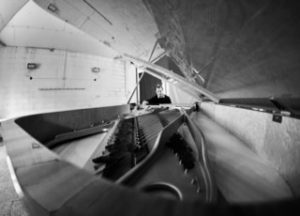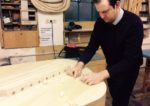Piano Maker’s Corner: Partners in Full Potential
 When I started having piano lessons, aged seven, I liked the idea of being a concert pianist. Sitting in front of a big, shiny piano in front of thousands of people, playing music everyday as my career.
When I started having piano lessons, aged seven, I liked the idea of being a concert pianist. Sitting in front of a big, shiny piano in front of thousands of people, playing music everyday as my career.
It soon became apparent that, although I was quite good, I didn’t have the commitment or drive to achieve that dream. To become a fully fledged concert pianist, the piano must become your life. It requires complete and utter dedication. Only a few will ever reach that level of mastery over the keyboard.
There was, however, an occasion when I was working on the personal piano for a concert pianist in London. We were having a conversation about both our careers and I discussed this lack of dedication. During this discussion he said something fascinating, which has stayed with me ever since:
“As a pianist, I’m only as good as my piano, and my piano technician”
First of all, I was struck by his humility. This particular, well known pianist is an exceptional musician. He went on: “I channel my emotions through the piano as I play. If the piano doesn’t allow me to do that, I don’t sound as good as I can be”
This made me think about my job. Is my career all that different from a concert pianist? The skilled and careful work of the concert technician to tune and prepare the action of a piano on the stage is, in many ways, equally as important as the skills of the pianist that performs. A perfectly regulated action will allow the emotions and feelings of the pianist to travel from his finger, down through the key, into the action, along the hammers, down the strings, through the bridge, across the soundboard, through the air and into the audience. If one of these aspects is not perfect, or if the entire keyboard is not exactly even, the chain is effectively broken and the quality of playing is diminished.
So, one question to ask yourself is: is my piano working at its full potential? A professional musician such as a piano teacher should have their piano serviced regularly, perhaps even once a year. A service should include a full action regulation, hammer voicing (if necessary) and a general “check up”. If you haven’t had this done, you and your students may not be playing as well as they could be! Dynamic control is something that is particularly compromised with a poorly regulated action, as well as repetition rate – something needed for successful ornaments.
I left my customer’s house with a slightly different view of my job. I might not be in the limelight, enjoying the applause and standing ovation of the audience but actually, I’m quite glad about that. I’m quite content to be standing in the wings, happy in the knowledge that my work may have made that clapping just that bit louder.


